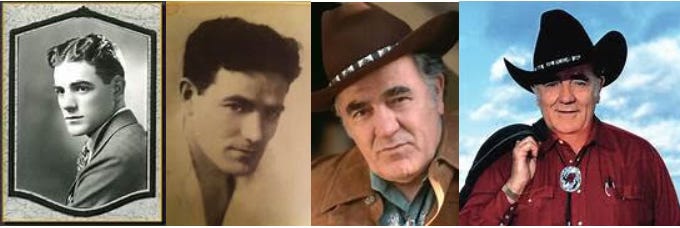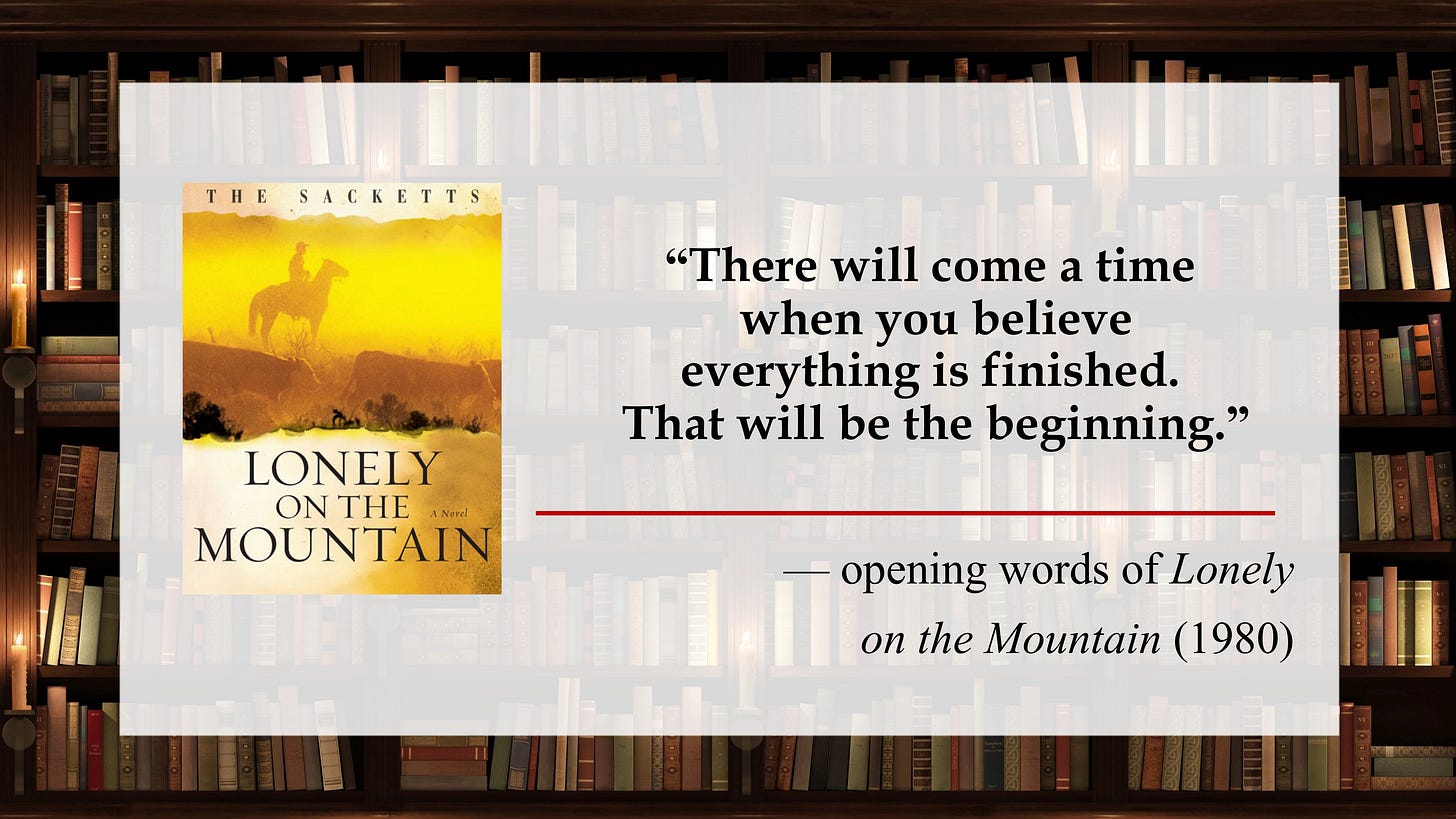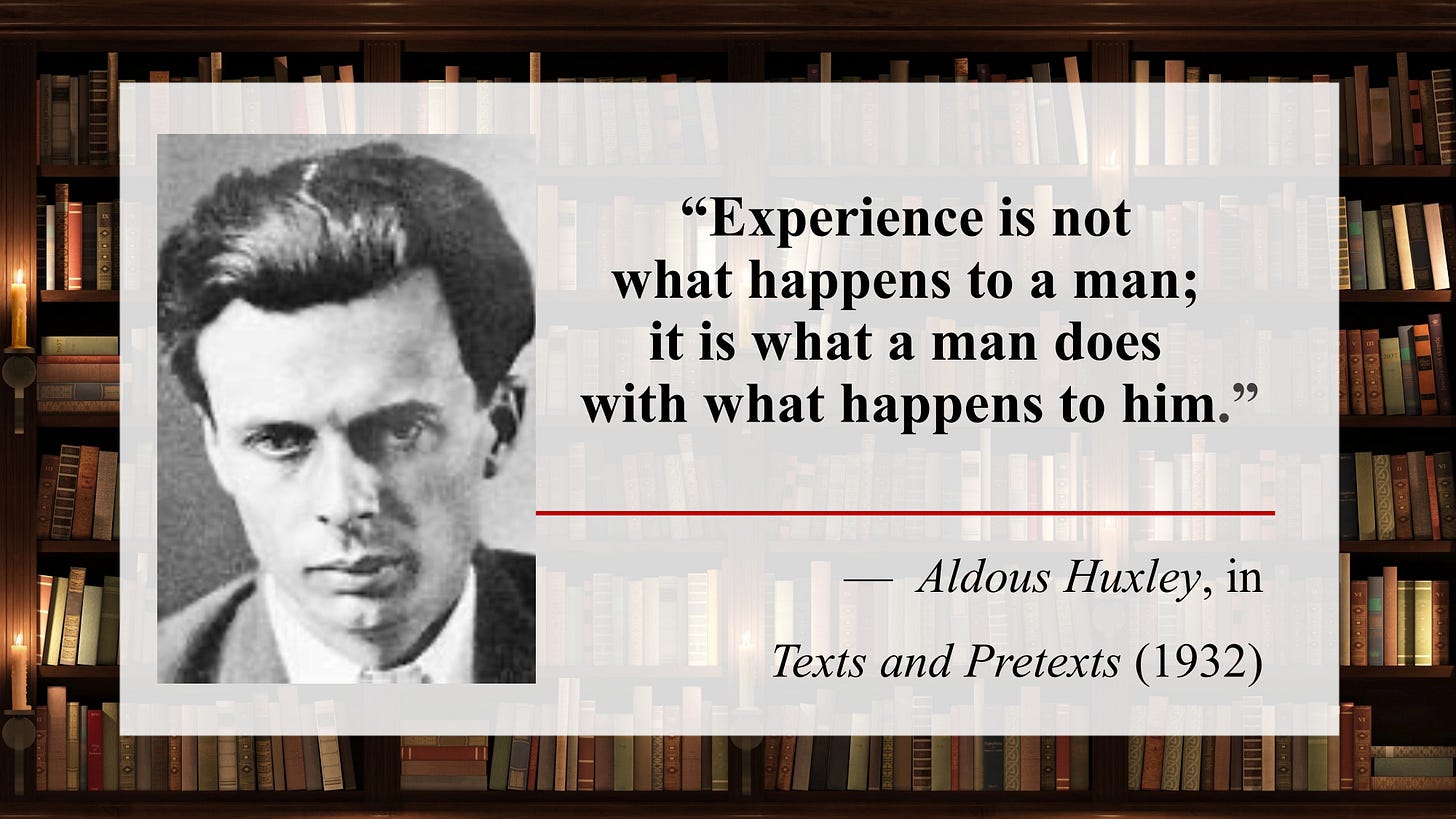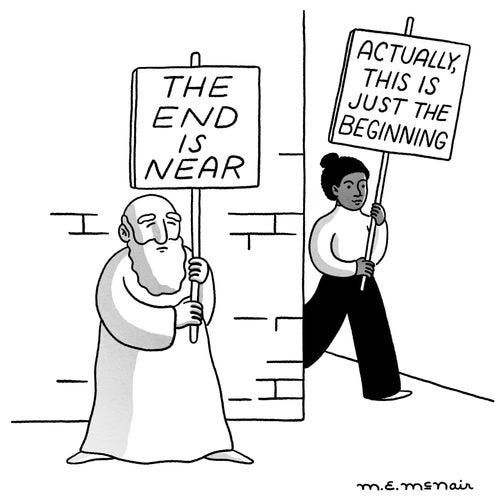Dr. Mardy's Quotes of the Week ("The End, or the Beginning?")
June 8 - 14, 2025 | THIS WEEK: “The End, or the Beginning?”
Opening Line of the Week
Albom begins by speaking directly to the reader in an informal, conversational style. His message is a modern echo of a timeless idea: the end of life is not really an ending, but a beginning. By offering a soft entry into a hard topic, his words frame Eddie’s death not as sad or tragic, but as the start of an adventure.
For more than 2,000 great opening lines from every genre of world literature, go to www.GreatOpeningLines.com.
This Week’s Puzzler
On June 10, 1988, this man died at age 80 at his home in Los Angeles (he’d been suffering from lung cancer for months, but continued to work until hours before he died). Born in Jamestown, North Dakota in 1908, he left school at age 15 to pursue a life of adventure. Like Mark Twain, he said he didn’t want his schooling to interfere with his education.
In his travels around the globe, he worked as a lumberjack, piloted an African schooner, lived with bandits in Tibet, mined for gold in California and Nevada, trained elephants for a traveling circus, and even became a professional boxer—winning 51 out of his 59 fights.
He once said he wanted to become a writer “almost from the time I could walk,” and few writers in history had a more impressive literary genealogy (he had 33 ancestors who were writers). He also once said that he fashioned himself as modern-day Chaucer, adding “I write my books to be read aloud and I think of myself in that oral tradition.” He began writing seriously in the 1930s and, for the rest of his life, he worked every day, including Sundays and holidays—with a goal of producing at least five pages a day.
By the early 1950s, his one novel—Westward the Tide (1951)—and numerous short stories had attracted an embarrassingly small readership, and he began to wonder if he’d ever come close to achieving his literary dreams. Then, in a completely unexpected development in 1952, “The Gift of Cochise,” a Collier’s magazine short story so impressed John Wayne that the actor purchased the screen rights for $4,000. After the story was adapted into the 1953 film Hondo (along with a companion book), our Mystery Man’s future brightened considerably.
He went on to become one of the century’s most popular and prolific writers, the author of 100 books—86 novels and 14 short-story collections—that sold well over 300 million copies. More than forty of his stories were made into feature films or made-for-TV movies. In 1983, he received a Congressional Gold Medal—the first novelist so honored—and in 1984 he was awarded the Presidential Medal of Freedom.
In his 1989 memoir, Education of a Wandering Man, he said he read 125-150 books a year. At the height of his career, his LA home had a library of 17,000 volumes. He was also one of literary history’s most quotable writers, routinely offering gems like the following from Lonely on the Mountain (1980):
Who is this man? (Answer below)
“Has a Brush with Mortality Ever Resulted in a New Beginning For You?”
This week, I’ll be returning to a theme I explored several weeks ago in my “Live Like You Were Dying” post. In that piece, I argued that it is not morbid, but healthy, to keep in mind that death can come at any time—and to live our lives accordingly. You will recall that the title came from a popular 2004 Tim McGraw song about a man who was told by his doctor that he had a malignant cancer—and a very limited time to live. Rather than descending into despair, he began to embrace life with a renewed intensity, doing things he’d long dreamed about—like riding a bull named Fu Manchu—and deepening his relationships with his loved ones.
This week, we’ll be exploring a related theme—the somewhat paradoxical idea that having a brush with mortality may be one of the best things that can happen to people. For those not familiar with the expression, a brush with mortality refers to an experience that doesn’t kill you, but is serious enough to get you thinking about your own death—as often seen with major accidents, health emergencies, or other life-threatening experiences.
The brush with idiom derives from one meaning of the verb brush: “to skim lightly against,” as when a person quickly brushes by you on a sidewalk or the leaves of a tree brush against your hair as you stroll through a park. The expression a brush with almost always implies a close encounter with something serious or potentially dangerous. For example, when you have a brush with the law, it means you’ve been questioned by the police, or maybe even taken down to the station, but never actually arrested or formally charged.
Why is a brush with mortality so beneficial? There are a bunch of reasons, I think, but the first is that during most of our lives, the vast majority of us are either not thinking about death or we’re viewing it as a distant, far-off-in-the-future event. After a brush with death, though, we sense—often for the first time—the imminence of death. And there are few things more compelling than a brief glimpse of the end of our own life.
The second is related to something that appears to be almost hard-wired into the DNA of high-functioning people: when something goes wrong, they have a deep desire to figure out what happened, why things went wrong, and what they can learn from the experience.
When we see people who don’t merely survive hard times but who are somehow able to thrive despite them, it brings to mind the famous Hemingway line that “The world breaks everyone and afterward many are strong at the broken places.” And when we examine the phenomenon more closely, we see that it goes well beyond the natural healing processes that Hemingway was talking about and into the arena of how effectively people cope with life’s travails and traumas.
While the idea of post-traumatic stress disorder (PTSD), has planted the idea that traumatic experiences have the potential to be devastating, it is also true that ancient observers in almost every part of the world commonly celebrated the ability of human beings to triumph over trauma. Simply consider all of the stories that have been told over the centuries about people who were somehow able to rise above not simply adverse conditions, but horrific ones.
Historically, the power of religious faith and psychological resiliency have often been credited for these amazing survival stories. In common parlance, perseverance and grit have often been cited as the key. In the field of psychology, we’ve also seen constructs like self-efficacy, ego-strength, and the ability to construct a narrative offered as explanations. But when I see remarkable recoveries from challenging and trying circumstances—including brushes with mortality—I like to call them examples of:
Post-Traumatic Growth Syndrome
Now let me be quite clear. This idea isn’t totally original to me. It was inspired by the concept of Post-Traumatic Growth (PTG), first offered by psychologists Richard Tedeschi and Lawrence Calhoun in their 1995 book Trauma and Transformation: Growing in the Aftermath of Suffering. For the life of me, I can’t figure out why they decided to call it Post-Traumatic Growth rather than the far more catchy Post-Traumatic Growth Syndrome, but that’s a discussion for another day.
Tedeschi and Calhoun defined PTG as the “positive psychological changes experienced as a result of the struggle with trauma or highly challenging situations.” In their research, ninety percent of the survivors of a wide variety of traumatic experiences reported at least one aspect of post-traumatic growth, such as a deeper appreciation for life, a renewed commitment to be a better spouse or healthier person, a new purpose to guide their lives, or a firm resolve to regain control over unhealthy choices and maladaptive patterns.
All of what I’ve written above is certainly true for me. I can still remember the moment in 1995 when, at age 53, my doctor told me that a biopsy had shown that three of the six tissue samples from my prostate gland were found to be malignant. With a malignant cancer, it’s not a question of if you’re going to die, but when. If my particular cancer had metastasized—something we didn’t know at the time—I was told it would be a death sentence. Happily, my surgery a few months later revealed that the cancer had not spread, and the prostatectomy effectively removed it from my body.
I now look back upon that whole experience with fondness, for it not only reminded me of the fragility of life, it forced me to confront an unpleasant truth about myself. For years, I’d been telling people I was writing a book, but I believe I was saying that mainly because it sounded cool. After discovering the word chiasmus in 1991, I’d been passionately collecting chiastic quotations. But collecting quotations is not writing a book. I hadn’t begun a book proposal. I didn’t have a book outline. And I hadn’t begun to write a single chapter.
My brush with mortality got me thinking, “What if I die before I bring this book to publication?” Four years later, I came out with Never Let a Fool Kiss You or a Kiss Fool You (1999). That first book ultimately led to seven more, and I believe my original cancer diagnosis deserves significant credit for helping to make it all happen.
As most of you know, I had yet another brush with mortality earlier this year when my heart’s rapidly deteriorating aortic valve was replaced with a state-of-the-art prosthetic device. The TAVR procedure, as it’s called, not only repaired a dying heart, it rekindled in me a strong commitment to live the remainder of my life in the healthiest way I can.
Does that commitment look like a New Beginning? So far, so good. As I write these words, it’s exactly fourteen weeks since my operation. In that time, I’ve almost completely transitioned to a “heart-healthy” diet and lifestyle. You probably know what that means in a general sense, but it’s had a highly specific meaning for me:
(1) a 98% decrease in the high-fat, sugary treats I used to indulge in almost every day (mainly ice cream, ice cream bars, and hot fudge sundaes). Why not abstain completely? Because I want to live a reasonably healthy lifestyle, not an ascetic one, and I don’t want to completely remove culinary pleasures from my life. I’ve now “re-framed” all of the foregoing foods as very occasional treats rather than a part of my regular diet.
(2) a 95% reduction in the amount of alcohol I consume, and a similar drop in my consumption of such high-fat, salty treats as potato chips, tortilla chips, crunchy cheese snacks, and french-fried potatoes. I now rarely drink by myself, and when we go to dinner at a friend’s house, I graciously accept a small glass of wine, but turn down all refill offers. My consumption of hard liquor has almost completely vanished, and I’m surprised to admit that I don’t even miss the martini I had every Saturday night after I posted my weekly newsletter.
(3) a significant increase in aerobic activity. For the past decade or so, I’ve gone to my fitness center two or three days a week, and it’s certainly paid off. Now though, I’m committed to some form of aerobic activity every day, even if it’s just a 30-minute early morning walk. Daily exercise, I’ve learned, may be even more important for my mental well-being than my physical health.
The Bottom Line? I’ve lost 17 pounds, and have eight more to reach my goal (I have every confidence I will). I’ve seen a significant reduction in my BMI, which had me in the highest level of the “overweight” category, just below “slightly obese”! When I reach my goal, I’ll be at the weight I was when I met Katherine 36 years ago—and I expect to retain that weight for the rest of my life. To keep me honest, I promise to provide occasional updates.
To those of you who might be thinking, “Isn’t it a little late in the game to be making these positive changes?” I can only counter with an observation from Lucius Annaeus Seneca (Seneca the Younger), who wrote in Agamemnon (c. 50 A.D.):
“It’s never too late to turn from the errors of our ways.”
How about you? Have you ever had a brush with mortality that prompted a New Beginning in your life.? If you have, I’d love to hear about it. Simply share your experience in the “Comments” section below.
If you haven’t, you might benefit from personally hearing the details of a brush with mortality story from someone in your family, neighborhood, church, or workplace. When you approach them, make sure you ask if they’d be willing to share any aspects of their recent experience. Once you get the green light, simply pose the question:
“How has your recent brush with mortality affected the way you view your life? More specifically, what did you learn from the experience and what changes do you think you’ll be making going forward?”
I can almost guarantee it will lead to a most stimulating conversation.
Before you do anything though, take a few moments to peruse this week’s compilation of quotations on this important theme in human life:
You desire to know the art of living, my friend? It is contained in one phrase: make use of suffering. — Henri Frédéric Amiel
Out of the wreck I rise. — Robert Browning
Pain was not given thee merely to be miserable under; learn from it, turn it to account. — Thomas Carlyle
If we accept and internalize the fact of our own mortality, then, by definition, we have to deal with the essential questions of how we live and spend our allotted time. We have to stop procrastinating, pretending that we have forever to do what we want to do and be what we long to be. — Lama Surya Das
The Promised Land always lies on the other side of a wilderness. — Havelock Ellis
You cannot avoid mortality. But you can choose your way of meeting it. And that is the most that any man can hope for. Live well, my son. — David Gerrold
I am convinced that it is not the fear of death, of our lives ending, that haunts our sleep so much as the fear that our lives will not have mattered, that as far as the world is concerned, we might as well never have lived. — Harold Kushner
The real glory is in being knocked to your knees and then coming back. — Vince Lombardi
On ruins one can begin to build. — Rose Macaulay
Not till we are lost…do we begin to find ourselves. — Henry David Thoreau
Cartoon of the Week:
Answer to This Week’s Puzzler:
Louis L’Amour (1908 - 1988)
Dr. Mardy’s Observation of the Week:
Thanks for joining me again this week. See you next Sunday morning, when the theme will be “Doing Good.”
Mardy Grothe
Websites: www.drmardy.com and www.GreatOpeningLines.com
Regarding My Lifelong Love of Quotations: A Personal Note











Live every moment as if it will be a first—because it is.
“It’s never too late to turn from the errors of our ways.”"
It is also never too late to turn from the ways of our errors.